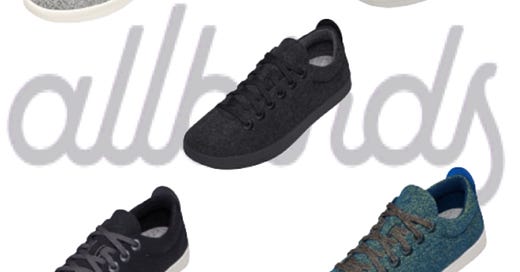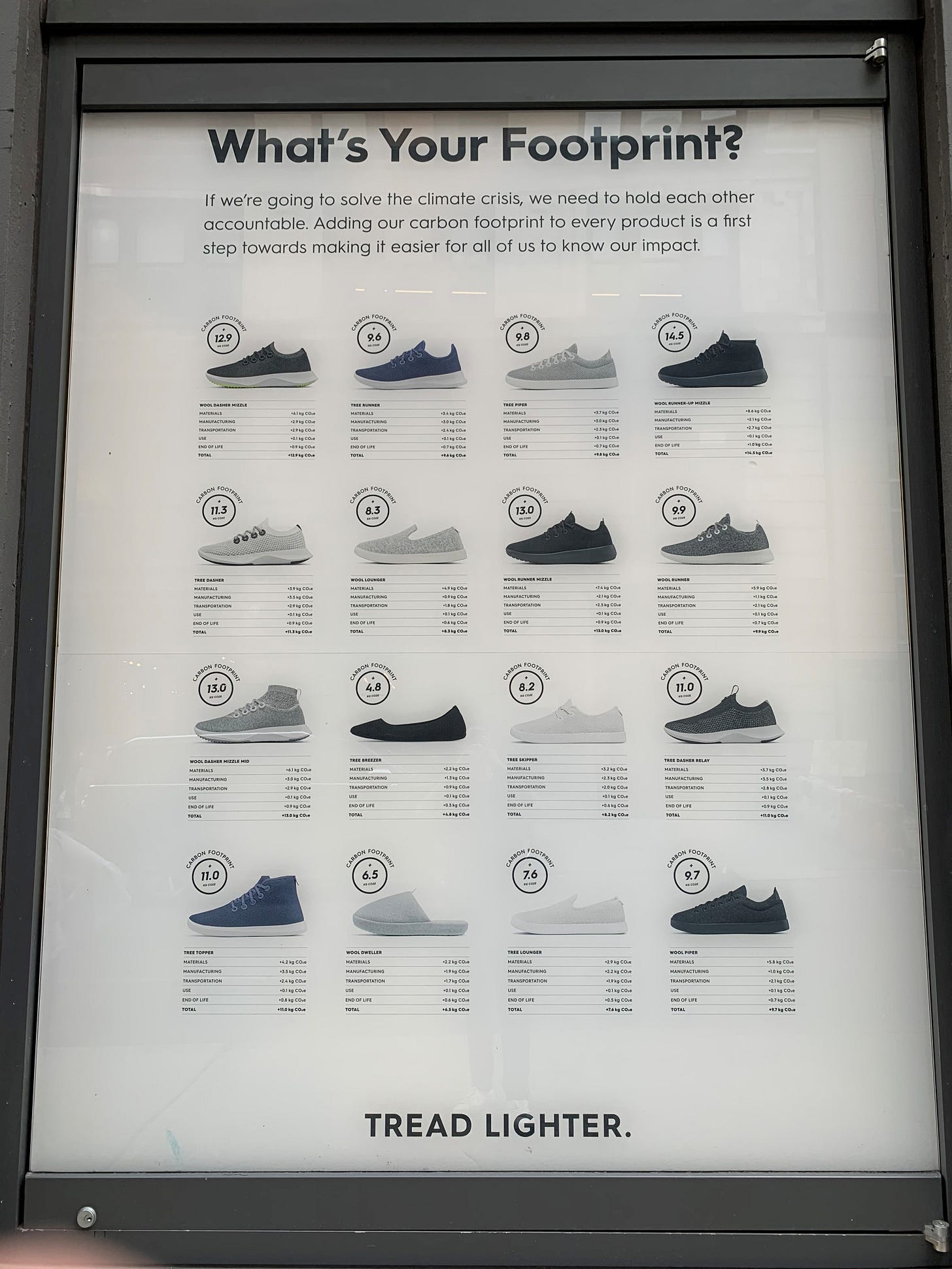Hey Everyone, we’re back with another Ty-PO Radar. Before we jump in, we’re going to do a quick debrief on our last highlighted company, Sportradar (Nasdaq: SRAD), whose IPO hit the press on September 14th. SRAD had some seriously high valuation expectations coming out the gate with an ~$8B valuation tag and a $27 share price. Unfortunately, by the week of October 25th, SRAD’s price slumped as low as $20 / share before seeing a slight rebound to its current share price of ~$22. I still believe that SRAD has a lot of future revenue potential, but we’ll have to stay tuned to see if the company can pull off an inspiring comeback in the public markets.
In today’s article, we’re going to be diving a little bit more into the consumer brands space to talk about Allbirds, a sustainability focused shoe & clothing company that recently filed its S-1 here. You may be scratching your head right now thinking, “Aren’t Allbirds those shoes you can put in the washing machine?” or “Are you talking about those funky looking mesh shoes?”. If these are the questions popping into your head, then you’re thinking about the right company. Despite a few interesting quirks to the Allbirds shoe brand, the company embodies a larger vision for sustainability in the clothing industry, and therefore it’s a business worth learning more about as it heads to the public markets. This Ty-PO Radar jumps into the weeds below:
About Allbirds
Allbirds is a sustainability focused shoe wear and apparel company. The two co-founders, Joseph Zwillinger & Timothy Brown, started the business in 2015 and currently lead the company with a cool mix of biology and athleisure backgrounds. Zwillinger spent several years in the biotech industry while Brown made his mark in brand development and as a national team soccer player in New Zealand. Their backgrounds translate perfectly to the overarching goals of Allbirds, which are (1) to scientifically innovate on processes that make clothing production more sustainable and (2) to create a killer consumer clothing brand that’s transparent about how much carbon you emit when you buy clothes.
On the production side, Allbirds has made a commitment to producing apparel that is nearly carbon neutral. Its most famous shoe, the Wool Runner, is made with sustainably sourced wool and on average produces 30% less carbon than a standard pair of sneakers. Allbirds has masterfully paired functionality with comfort into the Wool Runner, which resulted in Time Magazine awarding them the “world’s most comfortable shoe” in 2016.
For those of you who haven’t tried on Allbirds before, I can promise you Time’s designation of this honor is no fluke. Walking on a fresh pair of Allbirds is like floating on a cloud, and their fuzzy lightweight fit will definitely ~catch you some attention~ as you’re rocking them out in public.
In addition to pushing the boundaries of sustainable shoe materials, Allbirds has made a commitment to having a carbon neutral supply chain that is ethical and in compliance with basic human rights standards. Each supplier is required to agree to the Supplier Code of Conduct here before joining the Allbirds team.
Allbirds also remains fiercely focused on being transparent with how sustainable a customer’s clothing consumption habits are. I’m posting below a photo I took of the sign outside the Allbirds SoHo outlet (yes I went boots on the ground to write this article). As you can see from the sign, a consumer can see how much carbon was emitted in the production of each Allbirds shoe model. From the customer’s perspective, this information could help them make shoe purchasing decisions that are more sustainable because they’re now armed with the proper information on each shoes’ carbon emissions.
Source: Photo taken by Tyler Triscari at Allbirds – SoHo Outlet
I love carbon transparency as a core tenet of the Allbirds business model because I believe when people generally think about carbon emissions, they think about more obvious avenues of emissions like gas powered driving or coal factories. Allbirds breaks down this information barrier and shows the consumer that everything you buy has an impact on your carbon footprint, including your clothing, and you should have the right to know how much CO2 you’re emitting into the environment with any purchase.
Allbirds is a company that is breaking down barriers in apparel production and transparency, and they’re doing it with pizzazz and style. Hopefully as their popularity grows, other high profile clothing brands will move in the direction of Allbirds’ disruptive and more sustainable business practices.
Allbirds IPO Background and Key Figures
Today, November 3rd, 2021, Allbirds plans to raise about ~$250M in its public debut for a little over 10% of the total company, which would imply a valuation of ~$2.2B if the target IPO price is reached. This is a significant step up to the pre-IPO round that the company raised at a $1.6B valuation in late 2020, which was led but Franklin Templeton (see link in the Source section for more detail).
Here are the numbers you should know as Allbirds prepares for its public debut (see S-1 link in the Source section for more detail):
Allbirds produced $219M in revenue in 2020, up from $193M in 2019 (13% year over year growth)
Allbirds produced $112M in gross profit in 2020 (51% gross margin) up from $99M in 2019 (51% gross margin)
Allbirds has yet to reach profitability and produced a -$26M net loss in 2020
~90% of 2020 sales come from digital / ecommerce buying channels, while the other ~10% comes from physical retail sales
The company currently operates 27 brick-and-mortar stores as of June 30, 2021, but plans to expand that footprint with its new IPO dough
Sales from repeat customers have increased significantly from 41% of total sales being from repeat customers in 2018 to 53% in 2020
Repeat customers at Allbirds on average spend 25% more in their second-year shopping with Allbirds than their first
The last bullet really hammers home the value proposition of the Allbirds brand. Over half the sales of Allbirds came from repeat customers in 2020. That’s a BIG deal, because it means that consumers are returning to Allbirds not only because they like the products, but because they believe in the idea of consuming sustainable apparel. More than ever, consumers are demanding more than just comfort out of the clothes they choose to wear. Many consumers want to know that what they’re wearing is sustainable and ethical and are willing to continue purchasing from brands that demonstrate a commitment to that. Allbirds is one of these brands, and up until now, the number of repeat customers they’ve acquired is a testament to their success.
The Big Picture: Allbirds as a Business Firmly Committed to the Environment
I don’t know about you all, but one thing that has scared the daylights out of me this year has been the volatility of the weather. We’ve dealt with rampaging monsoons in the Northeast, scorching wildfires in the West, and ravenous hurricanes in the Southeast. These crazy weather circumstances are not a bunch of random coincidences. The environment is changing rapidly, and climate change has become more of a global concern in recent years.
As of now, over 50 BILLION tons of fossil fuels are emitted into the atmosphere annually, and that number has only been going up in recent years. According to the UN Climate Change report released earlier this year, humanity will reach a “tipping point” within 20 years unless significant progress is made to fight climate change (see link in the Source section for more detail). This tipping point, which will occur when the average global temperature crosses the 1.5-degree Celsius threshold, will cause mass social and economic upheaval on Earth. That is an outcome that must be avoided at all costs, and the onus is on all stakeholders to proactively fight climate change going forward.
Enterprises and consumers must act in unison to combat climate change, and companies such as Allbirds will continue to play a large role in bridging this relationship. Allbirds not only has made strides in sustainable production practices, but they’ve also armed consumers with the information that could be used to guide more informed sustainable purchasing decisions. This hand in hand approach to stakeholder activism will continue to play a more dominant role in society, as it’s not just on enterprises to change the course of climate change. Enterprises need to help mold better consumer decision making, and Allbirds is one of the many companies that’s pioneering this effort.
Closing Thoughts
Allbirds is one of many companies that is recognizing the importance of sustainability across business practices. There are more and more companies popping up alongside Allbirds that are focusing on sustainable clothing consumption. These companies include Cariuma and Fair Harbor, and they’re growing at a rapid pace that could slow down the success and brand stickiness that Allbirds has built since its founding. When it comes to consumer brands, it’s important to create a fanatical following around said brand, and in this era, consumers attach themselves to brands that stand for a mission they believe in. The competition will be stiff, but if Allbirds can continue to push hard on their mission of sustainable, yet comfortable, clothing, they have a shot to be the “go to” apparel brand to help combat climate change.
TL;DR
Allbirds is a company that is focused on selling sustainable shoe wear and apparel. It produces low carbon emitting apparel while being transparent with consumers on how much their clothing purchases are affecting the environment. Today it plans to go public at an ~$2.2B valuation, which is expensive, but Allbirds does have the potential to be a leading sustainable clothing brand in the future.
Helpful Sources
Allbirds Pre-IPO Fundraising Round
Allbirds 5 Things to Know Before IPO
UN Climate Change Report Detail
Disclaimer
Please note that I wrote this article myself and that this article solely reflects my personal opinion and not the opinion of my employer, Providence Equity Partners L.L.C. (“Providence”) or any other employee of Providence. This article is not endorsed in any way by Providence and does not contain any information derived from my role or work at Providence. I am not receiving compensation for this article and have no business relationship with any company mentioned in this article.





Nice work Tyler, I love the in-person diligence performed in Soho.